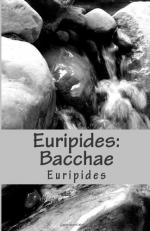|
This section contains 7,740 words (approx. 26 pages at 300 words per page) |

|
SOURCE: J. T. Sheppard, "Euripides," in Greek Tragedy, Cambridge University Press, 1911, pp. 122-55.
In the following essay, Sheppard discusses how Euripides expressed his philosophical and religious ideas in his plays and how they were received by his contemporaries.
The Athens of Pericles was the parent of another Athens less harmonious but not less great. Pericles, according to the Funeral Oration, found in his city the perfect marriage of reflectiveness and action, of art and simplicity, of philosophy and sense. Sophocles and Pheidias appeared to celebrate a religion free of superstition, and a spirit of enquiry neither flippant nor insane. In the salon of Aspasia, pious, austere and dignified Athenians may have listened to old Damon expounding the principles of music; to Zeno putting logical dilemmas; to Anaxagoras explaining how the world is a cosmos created by divine intelligence, the Nous; or to Protagoras discussing with his host the...
|
This section contains 7,740 words (approx. 26 pages at 300 words per page) |

|


